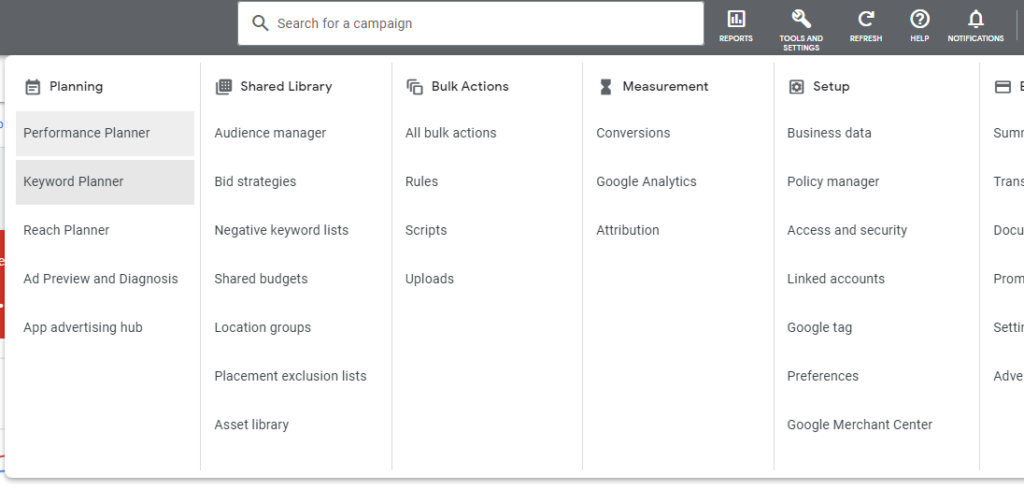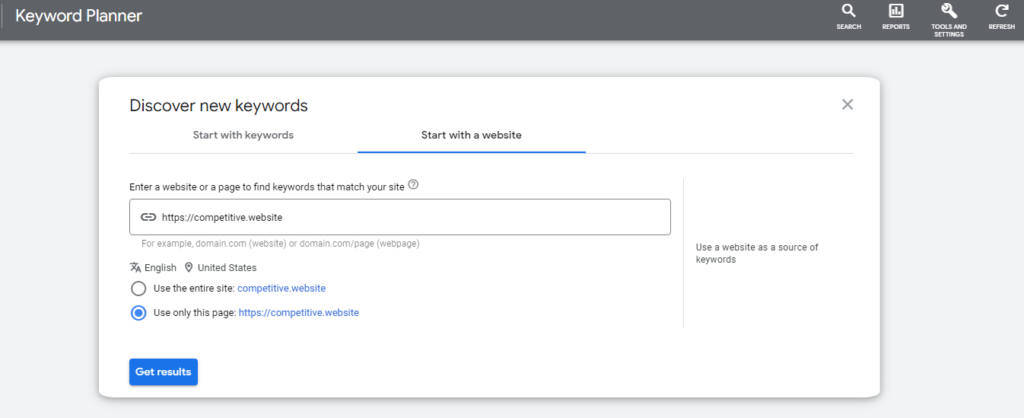One of the most important SEO tips for keyword research is to determine how competitive a particular keyword is.
If a keyword has high competition, it will be difficult for you to get to the top of the results. To avoid this, make sure to target keywords with low competition and high search volume.
You’ll also want to consider how competitive your industry is!, so that you can focus on long-tail keywords.
You can start your keyword research from Google Ads, and use the Google Ads Keyword Planner tool

Then go to Discover new keywords, and start with a website to discover keywords of your competitor’s website.

Keyword research
In addition to maximizing your rankings, keyword research also provides valuable insight into what your target audience searches for.
You’ll find that keywords that get a lot of traffic don’t necessarily attract the right kind of audience.
Ensure that the keywords you choose are relevant to your site and fit in naturally with your content. You’ll also want to consider their volume, authority, and relevance.
Keyword research should start with brainstorming. Try identifying keywords that describe your products and services.
Use tools such as Google’s autocompleting feature to get some ideas, also keywordtool.io can help to determine what people search for using google’s autocomplete feature, Alternatively, use a free keyword tool like Ubersuggest to get ideas from other users.
Meta descriptions
When you write a meta description for a site, make sure it is unique and satisfying to the user and contains your focus keywords.
Google tries to rank sites based on their content, so a well-written meta description can entice the reader to click on your link. The more unique your meta is, the more likely Google is to display your site in the SERPs.
The meta description should be readable and should match the page’s content. It should also avoid keyword stuffing, which will result in spammy results.
Try to write the meta description like you would a real sentence. Think of it like an advertisement for your site.
You want it to make the user click through to the page, and not the other way round.
A meta description should answer the searcher’s question. It should provide details on the post and mention the solution to their problem. Be sure to keep the description between 140 and 160 characters.
Page-level links
Page-level links are essential for search engine optimization. These links are used by Google to understand the content of a website and which pages are linked to the most.
Google analyzes these links with its Search Console tool. In most cases, the most frequently linked pages on a website are those listed on the sidebar, header, or top menu. The number of links to these pages is roughly even.
When implementing Page-level links, keep in mind that the hypertext linking to these pages should be descriptive of the category.
Adding a nofollow tag to a link will help preserve PageRank. In addition, the nofollow tag will keep unimportant links from being counted as a link.
This technique can also help boost the link value of more important links. But remember, Google is becoming more adept at determining whether a link is important.
If you want to create more internal links, link to high-performing organic pages. These links should have strong backlinks and be contextually relevant.
To identify high-performing organic pages, use tools such as Ahrefs, Analytics, and Search Console.
Featured snippets
Featured snippets are a great way to boost your SEO. Not only do they increase your visibility, but they can also increase your traffic. These small boxes appear above the search results on Google and don’t require the user to click to view the full source page.
Although Google doesn’t disclose the exact criteria they use, there are some guidelines you can follow to increase your chances of being featured.
Featured snippets are small boxes that appear on the first page of search results, usually in the form of a paragraph, list, table, or even video. These snippets help you gain more organic traffic.
In order to create a featured snippet, you need to optimize your website’s content with structured markup.
You can achieve this by making your website’s content rich in keywords and structured in a way that search engines can crawl and index it.
When creating your snippet, remember to focus on the experience of the consumer. By creating a great user experience, you will encourage repeat visits and increase conversions.
Make sure your content answers an important consumer question or need. It also has to be relevant to the search volume.
If a featured snippet is already serving up, it’s better to go with a query that does not yet feature a featured snippet.
Featured snippet content can be limited and have incomplete information, so you need to be sure to keep that in mind.
Long-form content
If you’re writing long-form content for SEO purposes, you’ll want to take a few steps to ensure that your piece is optimized for search engines.
First, make sure to analyze your audience and create content that speaks to them. Your goal should be to create content that is interesting, informative, and provides value for your readers.
Although long-form content isn’t the best format for SEO, it can still be successful if done correctly.
The most important thing to remember about SEO is that it is not as straightforward as it used to be. You need to incorporate keyword research throughout the writing process, so that your content will be optimized for many different keywords.
You can also incorporate several sections and headings to target different keywords across the entire topic.
Once you’ve optimized your content for search engines, you should use tools to optimize it for readability and other quality factors.
WordPress has a range of plugins that can help you with these tasks. Yoast SEO and Rank Math are two plugins that can help you fine-tune your SEO strategy. You’ll also need to include proper H1 tags and outbound links.
Linking to other sites
While you might be tempted to link to other sites as part of your SEO strategy, it’s important to remember that it will only hurt your SEO.
For example, if you’re writing about the best toys for dogs, you shouldn’t link to the number one dog toy ranking website.
Instead, you should link to a video or related article. In the same way, internal links help guide visitors to important pages in your website.
In addition, you can use an internal linking tool to suggest related posts.
The link popularity of your website will have a significant impact on your ranking. To increase your link popularity, you should look for quality sites to link to.
Make sure that the sites that link to yours are relevant and provide relevant content. The content and quality of the sites that link to you should also be relevant to the subject matter of the site.
The anchor text on your links is a vital part of your SEO strategy.
It should be relevant to the linked page and include your target keyword. For instance, “learning cable installation safety tips” as a link would include the target keyword and link to the page.
Getting links
One of the best SEO tips for getting links is to create unique content that attracts other websites to link to yours. Your content must be informative and useful.
You can also ask friends, bloggers, and tech-savvy webmasters to share it on their sites. These editorially-earned votes are very helpful in building rankings, trust, and authority.
Creating resource pages is another effective way to get links. You can use advanced Google operators to find resource pages and good link targets.
Another great SEO tip for getting links is to analyze your competitors’ backlinks. Use a link analysis tool to determine where your competitors get their backlinks.
You can use this information to write better content and attract guest posts. Include “Tweet This” links to encourage social sharing. It’s important to use a variety of methods to build links.
The internet is full of opportunities for link building. There are many blogs, forums, and thematic sites.
You can also use tools like SERP Research Tool to find the best results. These tools allow you to sort results by strength, theme, or any other metric.



